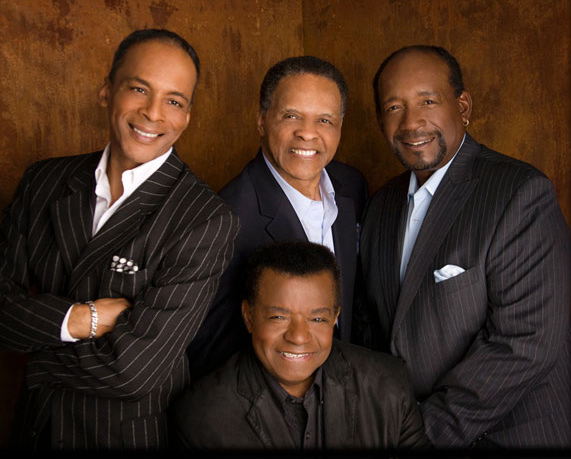In Celebration of the Human Voice - The Essential Musical Instrument
Home | Doo Wop | Barbershop | World | Contemporary | Christian | Vocal Jazz | Choral | Christmas | Instructional | Arrangements
Classical | Opera | Musicals | Personality | Young Singers | Disney | Videos | Songs | The Artists

Little Anthony and the Imperials History

Click Here for Sheet Music and Songbook Vocal Arrangements
Little Anthony and the Imperials were one of the finest vocal groups to emerge from the talent-rich New York scene. Moreover, they enjoyed unusual longevity for an act of that type, having hits in both the doo-wop Fifties and the soul-music Sixties. They outlasted their peers by virtue of "Little Anthony" Gourdine's powerful, beseeching vocals and the consummate professionalism of the Imperials, who mastered a broad range of material and knew how to work a stage.v It all started in Brooklyn, where Gourdine and friends grew up in the throes of the vocal-group craze. His first groups were called the Duponts (after the chemical company) and the Chesters. The latter group got signed to music-biz impresario George Gouldner's End Records. Wanting a name more regal than the Chesters, the label rechristened them the Imperials. It was Alan Freed, then an influential New York disc jockey and concert promoter, who christened Gourdine "Little Anthony," for the youthful quality in his voice. Both Freed and fellow deejay/promoter Murray Kaufman (a.k.a. "Murray the K") liked Little Anthony and the Imperials and helped launch their career with airplay and concert bookings. "Tears on My Pillow," their first single as the Imperials, was released on End Records. This classic vocal-group ballad was one of the biggest hits of 1958, reaching #2 on the R&B chart and #4 on the pop chart. Little Anthony and the Imperials were suddenly stars. The story might have ended there, with "Tears On My Pillow" fondly recalled as a vocal-group classic from one of the many one-hit wonders from that era. In fact, some of their followup singles did flop, strong as they were. But the group rebounded with an uptempo number, "Shimmy, Shimmy, Ko-Ko Bop," that capitalized on a dance craze. Little Anthony and the Imperials enjoyed even greater success in the Sixties with a string of chart singles on the DCP label. Their renaissance followed a two-year hiatus during which Little Anthony pursued acting while the Imperials worked the "borsht belt" circuit of resorts in the Catskills. The time off served to season both parties, and they reunited stronger than ever. Against fierce competition from the British Invasion and Motown, Little Anthony and the Imperials had back-to-back Top Ten hits with "Goin' Out of My Head" (#6) and "Hurt So Bad" (#10). Both were dramatic pop-soul epics about romantic loss that were keyed by Little Anthony's fevered, confessional delivery and a strong vocal arrangement. Each song has been heavily covered by other artists, as well. The Letterman returned "Goin' Out of My Head" to the Top Ten in 1968 and Linda Ronstadt did the same with her revival of "Hurt So Bad" in 1980. The story didn't end there. Little Anthony and the Imperials became the first group from the contemporary realm to play New York's prestigious Copacabana nightclub, predating the Temptations and Supremes into this more "adult" room. The group also continued their hitmaking ways, charting ten more singles between the mid-Sixties and mid-Seventies, including "Take Me Back" and "I Miss You So." In 1974, they reached #25 on the R&B chart with "I'm Falling in Love With You." It was their final hit of any consequence. All totaled, Little Anthony and the Imperials placed 21 singles on the pop or R&B charts in three different decades - a formidable record of achievement for this durable vocal group. |
Select a Category |
Want to Sing? - Find a Chorus Near You
List of Choruses by State | List of Choruses by City
